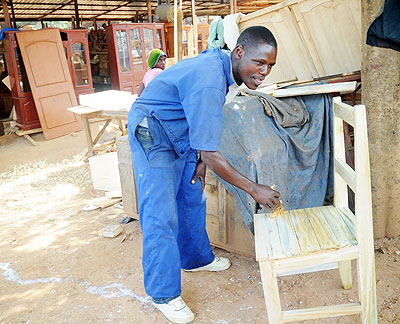Entrepreneurship was made a compulsory subject in Rwandan schools a few years back. The government went a step further and made it examinable in the last year’s national exams. Students performed fairly well and with more effort and resources, the graph will continue rising up.


Entrepreneurship was made a compulsory subject in Rwandan schools a few years back. The government went a step further and made it examinable in the last year’s national exams. Students performed fairly well and with more effort and resources, the graph will continue rising up.However, one big question many people ask is whether after all this knowledge and information, can a person actually engage in practical entrepreneurship and do a real business. The answer to this will depend on various factors including the level at which a student can take risk, accessibility to capital, availability of relevant business skills and the 3Ps of start ups (Patience, Perseverance and Persistence).It is imperative for students to develop a third eye in identifying opportunities and take a bold step to put up a business into action. I would like to advise them that starting a business is an ongoing process and therefore even as they study entrepreneurship in school, they need to scan their environment and find the simplest form of business that requires very little capital to start. For example bread making or even processing of juice using a cheap blending machine. A serious student will even save part of his/her pocket money and engage in a simple business once schools are closed. They can design wedding cards for their friends’ wedding using the knowledge they have learnt from computer studies.Most of the times people only tend to dream big without resources. There is Kinyarwanda saying that goes, ‘buhoro buhoro ni rwo rugendo’ (Step by step, one goes far) and therefore a student should know that it is not too early to start a small business and learn the challenges that entrepreneurs face as they operate their businesses. This kind of hindsight will give them experience on good decision making that would be very vital in their future investments.Parents with businesses are also advised to give their students an opportunity to learn business skills in their own enterprises. They can do this by giving them attachments or internships during school holidays so they put their book keeping skills into practise. At the same time those who do not have businesses, can send their kids to volunteer in their friends businesses or other organisations. This kind of exposure will give students the real picture of the activities that take place in an enterprise.Many successful people like American tycoon, Donald Trump learnt their entrepreneurship skills as apprentices. Donald Trump himself worked in his father’s wine business and developed strong business acumen. Trump is today one of the wealthiest people in the world and still acknowledges the effort his father put in to make him the successful businessman he is today.For entrepreneurship to take root in Rwanda, we need to fully acknowledge and appreciate its role in developing the economy of this country. I would also like to suggest that in the future, the Rwanda Examination Board should come up with Entrepreneurship paper III which will be examinable at the end of senior six and will involve a practical project that will have students designing and implementing a real business during their lifetime in advanced level studies. I believe this will even give more weight to entrepreneurship as a subject.The writer is a teacher at Riviera High School




